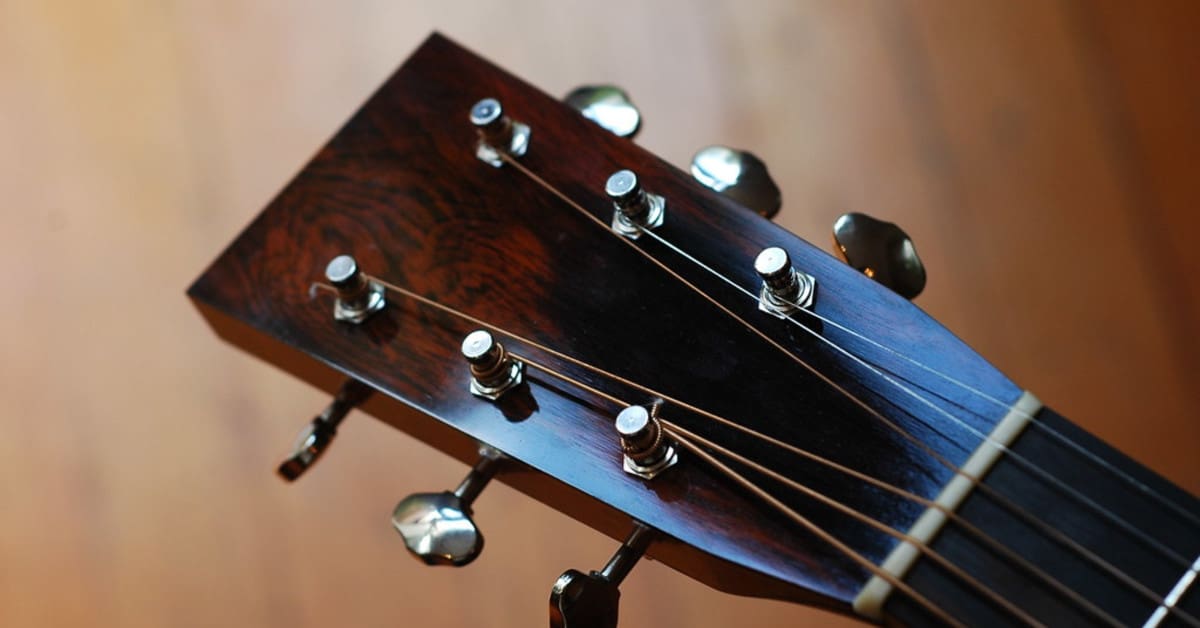There are both pros and cons to having your guitar out of its case.
Of course, having your guitar out means you are more likely to play it, as you’ll see it sitting there when you walk past, or into the room your guitars are stored.
However, leaving guitars out exposes them to the risk of accident, and also increases their exposure to humidity-related damage.
As they say, “guitars that are not displayed, don’t get played” so throughout this article, we will explore these risks, how they can be managed, as well as how the risks differ between acoustic and electric guitars.
Is It Ok to Leave an Acoustic Guitar Out of a Case?
It can be ok to leave an acoustic guitar out of its case, but there are some precautions that need to be taken to reduce the risks involved.
Reducing Impact of Humidity on an Acoustic Guitar
The number one concern with leaving your acoustic guitar out of its case is the potential impact of humidity.
Even when inside of their cases, guitars are still vulnerable to atmospheric changes, but outside of their case, this vulnerability increases dramatically.
Big swings in humidity can cause the different woods in your guitar to expand and contract at different speeds which can lead to cracks at joints, and warping.
The best way to avoid this is to emulate music instrument stores where they have humidity-controlled environments and track it very closely.
You can buy special guitar humidifiers designed to sit inside guitar cases, but these are not suitable for guitars sitting outside of their cases.
If you are not in a position to directly control the humidity of the room your guitars sit in then you could consider purchasing a Dampit. Dampit’s are designed to maintain the moisture inside an instrument in periods of extreme heat or dry while still making your instrument playable at the same time.
Keep in mind the risk that humidity plays will be different, depending on where you live. Certain climates have more stable humidity, so it will not be as big of a problem, compared to other climates with extreme temperature swings, which are then managed with wood heaters, etc.
https://www.dampits.com/howtouse.html
Aside from the potential impact of humidity, there is also a more general risk to your guitar from prolonged exposure to sunlight, even daylight on your guitar, and its finish. In general, try and keep your acoustic guitar in a cool, shady part of your house and all of these risks will be minimized.
To measure the ongoing humidity in the room your acoustic guitars are stored in it would be wise to invest in a hygrometer. These devices give you a humidity reading so you can track it over time. 40-60% is the ideal range for a guitar.
Minimizing The Risk of ‘Accidental’ Damage to Your Acoustic Guitar
The other main risk to your acoustic guitar being out of its case that that of accidental damage or breakage. Whether you have other humans or animals in your house that may accidentally knock your guitar over or other objects in your house that could fall onto your guitar.
Stands and wall hanging hooks are a good way to offset this risk, but keep the possibility in mind and plan accordingly.
If you do opt for a stand then make sure the material used on the stand that will be touching the guitar is in perfect condition and not going to impact your guitar surface. Some players use a cotton cloth in between their guitar surface and the stand touchpoints to eliminate any possible contamination.
Is It Ok To Leave An Electric Guitar Out Of a Case?
There are some shared potential downsides to leaving an electric guitar out of its case. as an acoustic guitar but also some unique risks.
Electric guitars (unless hollow-bodied) are not at risk from humidity in the same way that acoustic guitars are. However, they are at risk for the same types of accidental damage.
The same advice I provided with respect to acoustic guitars is relevant to electric guitars in that it’s important to find a suitable location to sit/stand your electric guitar, out of harm’s way. It’s also important to keep the surface of your electric guitar in mind and make sure the stands are not going to leave any marks and consider a protective cloth in between.
Potential Damage To Your Electric Guitar Components
The risk that is applicable to leaving your electric guitar out, which does not apply to acoustic guitars is potential corrosion of the electrical components from air exposure.
This is unlikely to be cause for concern over short periods of time, and you can reduce this risk by a periodic wipe down of your electric guitar, the pickups, and the selector.
But if you plan to leave your guitar out all the time, over months and years this could be an issue. So keep it in mind, and do some basic guitar maintenance to avoid it happening.


